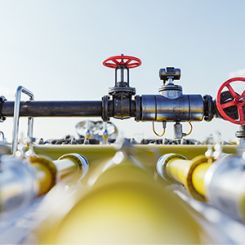ALEXANDRIA, Va.— The Water Environment Federation (WEF) proudly announces the 2021 class of WEF Awards for Operational and Design Excellence recipients, as well as winners of WEF’s Citation of Excellence in Advertising.
These awards recognize individuals and organizations that have made outstanding contributions to the water environment profession through their innovative approaches to fabricating, marketing, or utilizing water infrastructure.
“Effective, efficient, and equitable deployment of water and wastewater infrastructure requires champions within the sector daring and capable enough to pursue new ways of doing things,” said Lynn Broaddus, WEF President. “The WEF Awards for Operational and Design Excellence, as well as WEF’s Citation of Excellence in Advertising, recognize these crucial changemakers.”
Winners of the 2021 WEF Awards for Operational and Design Excellence include:
Collection Systems Award: Angela D. Charles and George Kurz
The Collection System Award is presented to an individual for contributions to the advancement of wastewater collection.
Angela D. Charles has worked for the City of Charlotte, N.C., since 1988, working in numerous roles in wastewater and stormwater management as well as administration. Charles currently serves as director of Charlotte Water, leading a group of over 1,000 employees. Charles has developed numerous educational programs to help employees develop in their operations careers. In most recent years, Charles initiated an apprenticeship program that has developed into a highly successful and model program. Charles is a longtime WEF member and active in its Collection Systems Committee and Collection Systems Symposia.
George Kurz has been active in several facets of collection systems during his 45-year career in Chattanooga, Tenn. He designed and implemented Chattanooga’s pretreatment program, which was the first approved by the state of Tennessee. In 1985, Kurz architected Chattanooga’s municipal compliance plan for sewer rehabilitation and control of sewer overflows. Kurz additionally transcribed over 170,000 data points from Tennessee Monthly Operating Reports into a simple spreadsheet for infiltration/inflow analysis. This spreadsheet is now used by operators to analyze the inflow/infiltration in their collection system. He is a Life Member of WEF, serves on the WEF Collection Systems Committee, and has previously served as president of the WEF Member Association representing Kentucky and Tennessee.
Morgan Operational Solutions Award: Michael Parsons
The Morgan Operational Solutions Award recognizes valuable contributions to the in-facility study and solution of operational problems.
During his career with the Hampton Roads Sanitation District in Virginia Beach, Va., Michael E. Parsons has developed and demonstrated biological nutrient removal (BNR) processes that will revolutionize the industry. Using an innovative conversion process, Parsons replaced the aeration tanks at a water resource recovery facility (WRRF) with a unique, five-stage biological nutrient removal process for less than $200,000. Using homemade materials, Parsons converted a 15-mgd WRRF from a fully aerobic step-feed process to a two-pass step-feed BNR with an anaerobic zone. He currently oversees the operation of two pilots testing partial denitrification/anammox.
WEF Project Excellence Award: Longmont (Colo.) Biogas Treatment and RNG Fueling Station; Metro (Denver, Colo.) Wastewater Reclamation District Nuisance Struvite and Dewaterability Improvements; and Portsmouth, N.H. Peirce Island Wastewater Treatment Facility Upgrade
WEF's Project Excellence Award pays tribute to excellence and innovation in the execution of projects and programs in the water sector.
The City of Longmont’s innovative biogas-to-renewable-natural-gas (RNG) project equipped their 13-mgd WRRF with a biogas-upgrading system that treats and converts 140,000 ft3/day of biogas into RNG. This gas is transferred to a new vehicle-fueling station that serves the city’s natural-gas-fueled trash and recycling trucks.
Driven by regulatory requirements, WRRFs have been implementing biological phosphorus removal to address current and future total phosphorus limits. Anaerobic digestion of the waste solids from the biological phosphorus removal process has been associated with deterioration of dewatering performance. Metro Wastewater Reclamation District’s Nuisance Struvite and Dewaterability Improvements project involved constructing the world’s largest phosphorus recovery reactor tank to address these challenges.
The Peirce Island Wastewater Treatment Facility upgrade project sustainably redeveloped an operating WRRF on an island with limited access and extensive archaeological and recreational resources located in historic downtown Portsmouth, N.H. The team delivered a successful project on a court-ordered schedule with increased capacity, secondary treatment, and total nitrogen removal without expanding the site while overcoming public opposition.
WEF Safety Award: City of Garland, Texas Duck Creek Wastewater Treatment Plant
The WEF Safety Award encourages active and effective safety programs in the water environment field and recognizes entities that not only invest their resources to develop high-quality safety programs and adopt them within their own culture, but also actively seek out opportunities to share these programs with others in the water industry for the benefit of all.
The City of Garland, Texas has established a strong program for investigation, corrective action, and education to prevent recurring regulatory issues. The city trains its employees in safety and risk management trends, legislation, products, and practices through their drafted Safety Connection: an inter‐departmental forum for safety review, education, and exchange of ideas. These efforts manifested in two long-term streaks of zero lost-time incident over many years of operating two WRRFs.
Industrial Water Quality Achievement Award: Bongards Creameries (Perham, Minn.)
The Industrial Water Quality Achievement Award is presented to a corporation and, if applicable, to its engineering firm that best demonstrates significant, lasting, and measurable excellence in water quality improvement or in the prevention of water quality degradation as demonstrated by innovative design and operation of an industrial wastewater, pretreatment, or source-prevention program.
By implementing new, sustainable practices, Bongards Creameries, located in Perham, Minn., minimized the volume of wastewater it produced and decreased the volume of potable water it used. Since 2015, Bongards has had a 28% reduction in wastewater production and a 40% reduction in potable water used per pound of milk processed, all while increasing milk processing by 60%. The increase in milk processing, however, caused an increase in the by-product “salt whey,” which added to the loading on the wastewater treatment facility. Bongards found a solution for this problem by turning the by-product into a viable feed product which is licensed to sell to local farmers.

